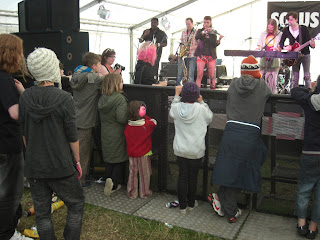 interview feature for clash magazine
interview feature for clash magazineDepressingly often, talking to a musician is far less interesting than listening to their music. When "we just make songs what we like, like" is the most perceptive explanation a band can give about their creative processes, the facepalm is instinctive. That's not the case with Dave Longstreth, mastermind of the Brooklyn-based Dirty Projectors, whose new album Bitte Orca is one of the best records of the year so far. Despite Bitte Orca being an endlessly inventive and fascinating listen - and a fun one too, beard-scratchers - he talks a real good game, if you can actually get hold of him. Sure, he's performing with David Byrne, and yeah, he's in the studio with Bjork; we've heard all these excuses before, press person! When Clash finally does touch base, he's still juggling a million things to do, but while we've got him, he's going to make an impression.
Dirty Projectors have been a going concern since 2002, and used to include two members of Vampire Weekend. In recent years they've been cultivating a reputation as a band easy to admire, but not quite so easy to love. Isn't the idea of a chopped-and-screwed rock opera about a suicidal Don Henley kinda amazing? That's Dirty Projectors 2005 album The Getty Address. And what if a band tried to cover an entire album that they hadn't listened to for 15 years, basing the whole thing on blurry fragments of teenage memories? That's Rise Above, from 2007, in a conceptual nutshell. Both albums had plenty of great moments, but ultimately felt like they were born of better ideas than execution. Bitte Orca isn't so easy to narrow down, but it seems like the absence of an overarching theme has taken the edge off its abstract experimentalism, allowing the band more room for baser aims, like hooks.
So I ask Longstreth to explain what Bitte Orca's about, really, and he says this: "Collapsing dualities, conciliating factional antagonisms, creating Mexican blankets of formal beauty and arresting emotionality". I don't quite know what to say to that, so he continues: "Parsing the future for potsherds of the past, reggae kaleidoscopes, goofing around with noise-gated snare drums". There's a pause. "'Stillness Is The Move' is sort of a love song" he continues, much to my relief. "The beat is based on T-Pain. We commissioned a radio mix of the song by the guy who mixes all of Timbaland's records, but the mix we made sounded way better, so we didn't use it." 'Stillness Is The Move' is the album's first single, a juddering, trilling, soaring kind of alien R&B ballad, featuring bright lead vocals from Amber Coffman. Explaining the new prominence of both female band members -- following song 'Two Doves', a clear tribute to mournful German chanteuse Nico, is sung by Angel Deradoorian -- Longstreth says "I wanted it to feel like a Beatles album, each of the singers with a lead number, playing with foreground and background. So much of our singing is about sharing a melody between two voices, or dividing a harmony into component voices, you know. Giving the girls a lead number felt like a natural application of that idea to the album as a whole."
Like all Dirty Projectors albums, Bitte Orca is packed full of ideas - but this is the one which gets them all to coalesce together most smoothly. It's all pretty odd on first listen: you'll hear flashes of Peter Gabriel, King Sunny Ade, Pere Ubu, Captain Beefheart, Talking Heads, The Fiery Furnaces, Arthur Russell and Frank Zappa in there at different times, not forgetting the aforementioned T-Pain and Nico. Somehow, even though he's pulling from so many different boxes, Longstreth still manages to put his hundred-piece puzzle together and form a clear picture, a picture that looks in whole like no-one else. It's been enough to convince two of the world's most critically revered musicians, David Byrne and Bjork, to collaborate with Longstreth in the last few months. Firstly, Byrne and Dirty Projectors recorded 'Knotty Pine' together for the Red Hot Organisation's Dark Was The Night charity compilation this winter. Then Bjork got in touch, having been impressed by a Dirty Projectors cover version of her own 'Hyperballad', and Longstreth agreed to write a suite for her to sing, again in support of an AIDS organisation. The six-song Mount Wittenberg Orca, which is planned for release "sometime", is about an imagined moment of eye-contact between Coffman and a whale. "Bjork is a huge inspiration for me," Longstreth says, "It was a big honour to write music for her. She said the only other person's music she's ever sung was Schoenberg's Pierrot Lunaire." That's not a name that often gets dropped in interviews with indie-rock bands. But Dirty Projectors are not a normal indie-rock band.



















